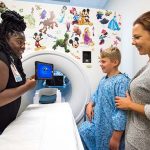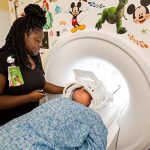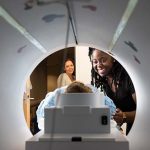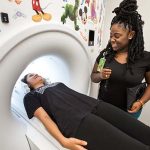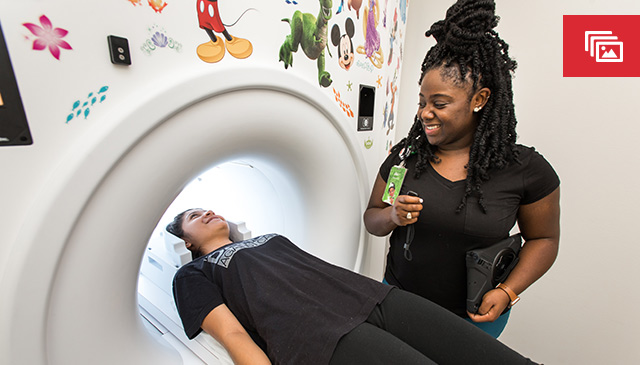
For patients like 5-year-old Legend Pruitt, a visit to the doctor’s office can be a scary place for a child, especially if they don’t know what to expect when they come in for a medical procedure. A few months ago, when Legend had his MRI at Texas Children’s, his mother was surprised by how well he did, and how calm he was during the scan.
“He didn’t move at all because he knew he had to stay still for the MRI,” said Legend’s mother Niayeshua Joseph. “When my son had MRI scans before, he would have to be placed under anesthesia, because he could not stop moving. He is now more comfortable and the noises from the MRI machine don’t bother him.”
In an innovative effort to decrease the need for anesthesia in our MRI patients, Texas Children’s Radiology team bought the organization’s first mock MRI scanner last year thanks to a generous donation from one of our patient families. The mock MRI scanner provides a realistic simulation of what patients can expect before the real exam.
“This innovation allows patients to practice their scan before they enter the real scanner so they can understand their role (to lie still) and are more comfortable with something that is unfamiliar to them,” said Texas Children’s Radiologist-in-Chief Dr. Thierry Huisman. “Mock MR scanner training and familiarity with the MR imaging procedure enhances patient experience, reduces patient and family anxiety, and optimizes patient cooperation which can improve image quality or may allow for imaging without the need for patient sedation or general anesthesia.”
The mock MRI scanner on the fifth floor of Texas Children’s Lester and Sue Smith Legacy Tower, looks and sounds like a real MRI scanner. It has a bed that patients can lie on and travel into a tunnel similar to a real MRI scanner. The MRI scanner makes loud noises while the pictures are being taken. The mock MRI scanner simulates those noises and prepares a child for what to expect before they are scanned using the real machine. One additional advantage is that the mock MRI scanner does not include the “big magnet” and allows patients and families to attend without limitations. Furthermore, the mock MRI scanner does not use costly time as the real MRI unit.
Patients can get prepped with the mock MRI scanner in two ways. If the radiology pre-call nurse identifies a patient through their screening, they can schedule an appointment with a child life specialist several days before their procedure. Patients can also test out the mock MRI scanner immediately before their MRI appointment.
After introducing the mock scanner in July 2019, Radiology has seen amazing conversion results. Since June of this year, 67 patients have used the mock MRI scanner and 39 MRI patients scheduled for general anesthesia were converted to non-sedate procedures.
“We are really excited about our initial success,” Dr. Huisman said. “We are grateful to have this resource available to our patient families, and incredibly grateful to the Cook family’s philanthropic donation to make this all possible.”
A generous gift to help others
Brady and Nancy Cook know first-hand the challenges patient families face when a young child has to undergo an MRI especially for the first time. When their daughter, Alyssa, was in kindergarten, she started having complex partial seizures and was later diagnosed with a brain tumor. The brain tumor was believed to be in the area of the brain where speech is generated but doctors didn’t know for sure unless they performed a functional MRI on her.
“With a functional MRI, the patient has to be awake in the MRI machine and respond to images that flash up on the screen inside the MRI without moving because it would distort the quality,” said Brady Cook. “For that reason, it’s typically not done on 5-year-olds, because they are unable to hold still for an hour and follow instructions like that.”
But everything changed when the couple came across a research study on the use of mock MRI scanners that taught kids how to be more comfortable around the MRI machine to the point where young children could endure it. Out of desperation, they got creative and built a mock scanner in their garage. They used a big refrigerator box, a dolly that you lay on to get underneath a car, a softball mask to simulate the cage that goes over the patient’s head, a school locker sized mirror, age appropriate flash cards, and downloadable sound effects mimicking an MRI machine.
“We practiced this on our daughter so she could get comfortable with the MRI machine,” said Cook. “Soon after, she was able to successfully complete a functional MRI without moving. Her MRI scans showed us that the tumor was nowhere near the area of her brain that generates speech, and therefore the tumor could be removed safely.”
Since the mock MRI scanner helped their daughter, the Cook family wanted Texas Children’s to have the capability of helping patients become more comfortable with the MRI machine. Through their generous donation to Texas Children’s, the family is grateful that the mock MRI scanner is making a positive impact on patients and families.
“As parents who have been through this before and the desperation we felt at the time, we would do anything to ensure patients are comfortable during this process leading up to surgery,” Nancy Cook said. “Now that we have a mock scanner here, we hope that it will continue to give parents and children added comfort and reassurance.”


